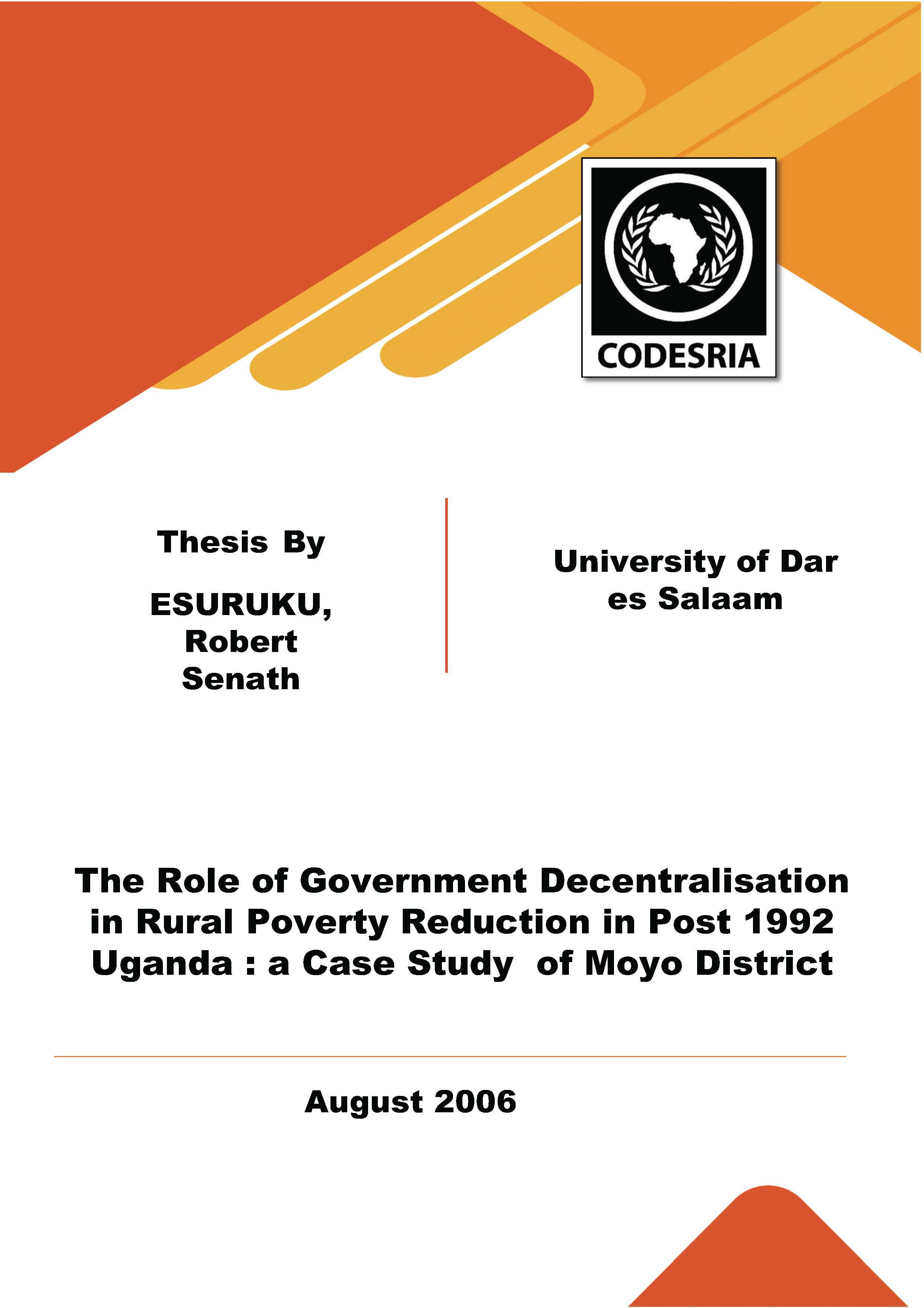The Role of Government Decentralisation in Rural Poverty Reduction in Post 1992 Uganda : a Case Study of Moyo District
Keywords:
Decentralization, poverty alleviation, public services, social services, rural areas, primary education, primary health care, sanitation, water management, roads, agricultural extension, rural poverty, UgandaSynopsis
Since 1990s, government décentralisation has assumed a significant rôle in social service delivery and poverty réduction in Uganda. It is believed to offer an opportunity to bring public services doser to local demands and preferences, and build more responsive and accountable government from the bottom-up. In Uganda, there is commitment from the central and the local governments and a framework is in place to achieve valuable progress towards poverty réduction through improved service delivery. This stffdy endeavoured to critically examine the rôle of government décentralisation in rural poverty réduction in post 1992 Uganda taking Moyo District as a case study. A variety of data collection méthodologies were used to gather the secondary and primary data needed for the study. These included interviews, structured and non-structured questionnaires, direct observation, and focus group discussions. The findings from the study suggest that government décentralisation is a silver lining in the clouds as far as poverty réduction in Moyo District is concerned. This is because the link between government décentralisation and poverty réduction is not direct. Although power and responsibilities bave been devolved to the local government, they continue to suffer from a variety of constraints. The problem of resource mobilisation and severe human capacity limitation is a challenge to poverty réduction efforts under the contemporary décentralisation program in Uganda and Moyo District in particular. Although government décentralisation in Uganda is driven primarily by a political motive of power and popular participation, one of its main goals is to increase effîciency and effectiveness in social service delivery with the aim of reducing poverty. In Moyo District, significant progress still needs to be made in the area of primary éducation, primary health care, water and sanitation, feeder/community roads, and agricultural extension services. The top community priority concerns about the rôle of government décentralisation in poverty réduction in Moyo District were good governance, political commitment to pro-poor growth; improvement in the quality, effectiveness and efficiency of service delivery; establishment of a clear propoor policy guidelines about the rôles of the central and the local governments; collaboration with NGOs, the private sector, and the local community. Gender and governance have been considered as crosscutting issues in the study.
Downloads
References
Ames, Brian, Ward brown, Shanta Devarajan, and Alejandro Izquierdo (2002). "Macroeconomic Issues" in A Sourcebook for Poverty Reduction Strategy, Vol. 2
Macroeconomic and Sectora Approaches, Washington, DC. VVorldBank.
Anastas, Jeane W., (1999). Research Design for Social Work and the Human Services. New York: Columbia University Press.
Andrew, Matthew and Schroeder Lan-y (2001). Sectorial Decentralisation and Intergovernmental Arrangement in Africa, Washington, D.C.: World Bank.
Aoki, Aya, Barbara Bruns, Michael Drabble, Mmantsetsa Marope, Alain Mingat, Peter Moock, Patrict Murphy, Pierella Paci, Harry Patrinos, Jee-Peng Tan, Cristopher Thomas, Carolyn Winter, and Hongyu Yang (2002). "Education" in A Sourcebook for Poverty Reduction Strategy, Vol. 2
Macroeconomic and Sectoral Approaches, Washington, DC. World Bank.
Asante, Felix A and Ayee Joseph R.A. (2004). "Decentralization and Poverty Reduction". http// www.isser.org/ Decentralization_ Asante_ Ayee. Pdf. Accessed on 6th January 2005.
Asiimwe, Delius (2002). "Decentralization and Transformation of Governance in Uganda". Kampala: Unpublished Book project Prospectus. www.uganda.co.ug/misr/reports Governance.pdf Accessed 7th June 2003.
Asselin, Louise-Marie and Dauphin Anyck (2001). Poverty Measurements: A conceptual Framework, Quebec: CECI.
Ayee, J.R.A., (2004). "Ghana: A Top-Down Initiative", in Dele Olowu and James Wunsch (eds.), Local Governance In Africa: The Challenges of Democratic decentralization, London: Lynne Rienner/ Boulder Co.
Aziz, Abdul and David D. Arnold (eds) (1996). Decentralised Governance in Asian Countries, New Delhi: Sage Publication.
Bakenegura, Rose Namara (2004). "Issues in the Implementation of Sector Policy at Local Levels in Uganda: Agriculture Extension" in Basic Principals of Decentralisation, Kampala: UMI and IMC.
Bamberger Michael, Yahie Abdullahi M., and Matovu George (ed) (1996). The Design and Management of Poverty Reduction Programmes and Projects in Anglophone Africa, Washington, D.C.: World Bank.
Bamberger, Michael, Mark Bleckden, Lucia Fort, and Violeta Manoukian (2002). "Gender" in A Sourcebook for Poverty Reduction Strategies, Vol. 1 Core Techniques and Crosscutting Issues, Washington, D.C.: World Bank.
Banyoya, Lawrence (2004). "The Financing of Decentralisation in Uganda" in Basic Principals of Decentralisation, Kampala: UM! and IMC.
Bardhan, Pronab (1997). The Role of Governance in Economic Development: A Political Economic Approach, Parish: OECD Development Centre.
Bardhan, Pronab and Dilip Mookherjee (1998). "Expenditure Development and the Delivery of Public Services in Developing Countries". CIDER Paper C98-104. Berkeley: University of California.
Basch, Christophe, Kirten Hommann, Gloria Rubio, Claudia Sadoff, and Lee Travers (2002). "Water and Sanitation" in A Sourcebook for Poverty Reduction Strategy. Vol. 2 Macroeconomic and Sectoral Approaches, Washington, D.C.: World Bank.
Bennet, Robert J. (ed.) (1990). Decentralization, Local Governments and Markets, Oxford: Clerendon Press.
Besley, T. ·(1997). "Political Economy of Alleviating Poverty: Theory and Institution", in World Development. Vol. 28. No. 1, p.21-39.
Bevan, P., and Joireman S.F. (1997). The Perils of Measuring Poverty: Identifying the Poor in Rural Ethiopia, Oxford: DS.






